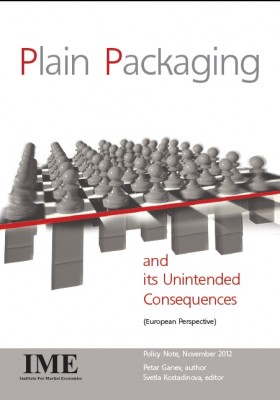Plain Packaging is Not a Health Policy
- enforcing plain packaging would have detrimental consequences on legal producers and their brands
- availability of information on a product is important since it informs the consumer
- plain packaging is not a health policy
November 27, 2012
The Institute for Market Economics has just published its latest Economic note on the effects of the EC proposal to revise the Tobacco Products Directive (2001/37/EC) to adopt a requirement of plain packaging. The Commission is now deliberating on the response to the public consultation and is expected to make recommendations in late 2012.
What is plain packaging?
Plain packaging means removing all distinctive elements (logo, colours, lettering) associated with a product and replacing them with a generic package usually including government mandated warnings (mostly related to health).
Plain packaging is not a health policy. It neither informs nor educates. On the contrary, it limits information and restricts choice.
Mr. Petar Ganev, senior economist at IME on the consequences:
“When packaging imagery is removed, consumer preferences move away from premium brands towards lower range, cheaper brands.
If the competition in such an environment focuses more on pricing strategies this could lead to a decline in prices in the market place. If greater price competition were to occur, there may be a possible increase in the level of consumption.”
The main conclusions of the research show that any implementation of plain packaging would at best represent merely a shot in the dark as far as public health is concerned, and, unfortunately, risks provoking consequences that are more negative than positive.
The available evidence shows that enforcing plain packaging on tobacco products would have detrimental consequences on legal producers and their brands, without reducing the consumption of tobacco. On the contrary, instead of reducing health risks, this policy would achieve exactly the opposite of its stated purpose by leading to an increase in the number of smokers. It would not be the first time that a seemingly well-intentioned policy produces harmful unintended consequences.
Moreover, tobacco may be just the first victim in a global attack on branding. Other products deemed “sinful” may well be targeted in the future: fast food, alcohol, and even soft drinks. In economics, the availability of information is important.
The full Economic note can be found here: Plain_packaging_IME_ENG.
Note to editors:
- IME is the first and oldest independent, non-government economic policy think-tank in Bulgaria established in 1993. It prepares economic research, provides independent assessment and analysis of the governments’ economic policies. For its successful activity, it was awarded several international and domestic awards. Find out more about the Institute for Market Economics at http://ime.bg/en/home/.
- This Policy Note is a European-perspective adaptation of “Plain Packaging and its Unintended Consequences”, Montreal Economic Institute, August 2011.
- The public consultation on the possible revision of the Tobacco Products Directive 2001/37/EC is available at http://ec.europa.eu/health/tobacco/consultations/tobacco_cons_01_en.htm.
For media:
Mr. Petar Ganev, IME senior economist
+359 2/952 62 66, 952 35 03



















No comments
Be the first one to leave a comment.